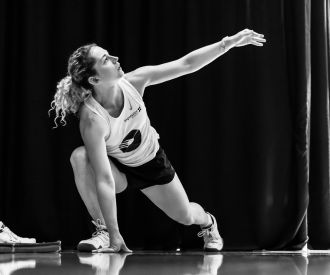Achieving peak performance in sports is no easy feat. It requires dedication, discipline, and a commitment to ‘control the controllables’ – the ongoing endeavor to keep on top of those things that you have direct influence over. No matter your level of skill, even the most talented players can find their efforts undermined by a few critical factors that they let slip. These things aren’t necessarily even that complex – many players however, lose sight of the wood for the trees.
While a lot of people obsess over which supplement, or which gadget, or which new piece of tech will be the key to success, these types of things are all but irrelevant if the true foundations are not being taken care of. The aspects most detrimental to achieving peak performance are actually all relatively quite simple – poor sleep habits, bad nutritional choices, and a lack of consistency in training. These three areas are often overlooked, but they play a significant role in determining whether a player can reach their full potential or fall short of their goals. This article will explore these three key areas, examining how they negatively impact performance and what squash players can do to overcome them.
 1. Poor Sleep
1. Poor Sleep
The Importance of Sleep for Athletic Performance
Sleep is a fundamental component of overall health, and its importance is magnified for athletes. During sleep, the body undergoes crucial processes that repair and rejuvenate muscles, consolidate memories, and regulate hormones. For squash players, getting enough quality sleep is essential for recovery, cognitive function, and physical performance.
During deep sleep, the body releases growth hormone, which is essential for muscle repair and growth. This process is vital for athletes who regularly push their bodies to the limit, particularly in such a high-intensity sport as squash. Without adequate sleep, muscles do not recover fully, leading to decreased strength, endurance, and an increased risk of injury.
Sleep is also crucial for maintaining overall hormonal balance, through its role in regulating cortisol (a stress hormone) and testosterone (important for muscle development and recovery). Poor sleep can lead to elevated cortisol levels, which can impair muscle recovery and increase the risk of injury. Similarly, it can reduce testosterone levels, which leads to decreased muscle mass and endurance performance.
Something else that sleep plays a crucial role in is optimal cognitive function, including your focus, reaction time, and decision-making. Squash players need to be mentally sharp during competition, and sleep deprivation can significantly impair these abilities. A lack of sleep can lead to slower reaction times, poor judgement, and an inability to concentrate—all of which can have a detrimental effect on on-court performance.
Despite its importance, many athletes struggle with poor sleep habits, which can have a number of negative effects on their performance beyond the aforementioned hormonal and cognitive issues including:
- Decreased Physical Performance: Lack of sleep leads to fatigue, which diminishes an athlete’s strength, power, and endurance. Studies have shown that even a single night of poor sleep can significantly impair performance in endurance sports, strength training, and high-intensity interval training.
- Increased Risk of Injury: Fatigue from poor sleep increases the likelihood of injuries. When athletes are tired, they are more prone to mistakes, both in technique and judgement. This can lead to injuries that not only sideline them but also have long-term consequences for their career.
- Weakened Immune System: Sleep is also essential for a healthy immune system. Athletes who do not get enough sleep are more susceptible to minor bugs and illnesses, which can disrupt training and competition schedules.
Improving Sleep Habits for Optimal Performance
To avoid the negative effects of poor sleep habits, athletes should prioritize sleep as part of their training regimen. Here are some good strategies to improve sleep quality:
- Establish a Sleep Routine: Going to bed and waking up at the same time every day helps regulate the body’s internal clock, making it easier to fall asleep and wake up naturally.
- Create a Sleep-Friendly Environment: A dark, quiet, and cool bedroom can help promote better sleep. Investing in a comfortable mattress and pillows can also make a significant difference in sleep quality.
- Limit Screen Time Before Bed: The blue light emitted by phones, tablets, and computers can interfere with the production of melatonin, a hormone that regulates sleep. Athletes should aim to turn off screens at least an hour before bed.
- Practice Relaxation Techniques: Stress and anxiety can make it difficult to fall asleep. Relaxation techniques such as deep breathing, meditation, and progressive muscle relaxation can help calm the mind and body before bed.
- Monitor Sleep Quality: Using sleep tracking devices or apps can help athletes monitor their sleep patterns and make necessary adjustments to improve sleep quality.
2. Bad Diet
The Role of Nutrition in Athletic Performance
Nutrition is the fuel that powers athletic performance. The food you eat provides the energy needed for training and competition, as well as the nutrients required for recovery and muscle growth. Poor nutritional choices can have a significant impact on an athlete’s ability to perform at their best.
Carbohydrates, fats, and proteins are the primary sources of energy for the body. Athletes require a balanced intake of these macronutrients to maintain energy levels during training and competition. Carbohydrates are particularly important for endurance sports, as they are the body’s preferred source of energy during prolonged high-intensity exercise.
Proteins are essential for muscle repair and growth. After a hard game or training session, the body needs a sufficient amount of protein to rebuild damaged muscle fibers. Without adequate protein intake, athletes may experience delayed recovery and muscle soreness.
Vitamins and minerals consumed in your diet also play a crucial role in maintaining a healthy immune system. Athletes who do not consume enough fruits and vegetables may be at a higher risk of illness, which can disrupt training and competition schedules.
Along with your food intake, proper hydration is vital for maintaining peak performance. Dehydration can lead to decreased strength, endurance, and cognitive function. Athletes need to drink enough water throughout the day, especially during training and competition, to stay hydrated and maintain optimal performance.
Athletes who make poor nutritional choices then, can experience a number of direct negative effects on their performance including:
- Decreased Energy Levels: Inadequate carb intake can lead to low energy levels, making it difficult for athletes to sustain high-intensity exercise. This can result in poor performance during training and competition.
- Impaired Muscle Recovery: Without sufficient protein, athletes may experience delayed muscle recovery, leading to increased muscle soreness and fatigue. This can affect their ability to train consistently and perform at their best.
- Increased Risk of Illness: A diet lacking in essential vitamins and minerals can weaken the immune system, making athletes more susceptible to illness. This can disrupt their training and competition schedules, leading to missed opportunities and setbacks.
- Dehydration: Dehydration can have a significant impact on performance, leading to decreased strength, endurance, and cognitive function. Athletes who do not stay properly hydrated may also be at a higher risk of heat-related conditions, such as heat exhaustion and heat stroke.
Making Better Nutritional Choices for Optimal Performance
To avoid the negative effects of poor nutrition, athletes should focus on making healthy dietary choices that support their training and competition goals. Here are some strategies to improve nutrition:
- Eat a Balanced Diet: Athletes should aim to consume a balanced diet that includes a variety of foods from all the major food groups. This includes carbohydrates for energy, proteins for muscle repair, and fats for overall health.
- Focus on Whole Foods: Whole foods, such as fruits, vegetables, whole grains, lean proteins, and healthy fats, provide the nutrients needed for optimal performance. Athletes should limit their intake of processed foods, which are often high in sugar, unhealthy fats, and empty calories.
- Plan Meals Around Training: Squash players should plan their meals and snacks around their training schedule to ensure they have the energy needed for exercise and the nutrients required for recovery. This may include eating a carbohydrate-rich meal before training and a protein-rich snack afterwards.
- Stay Hydrated: Proper hydration is essential for maintaining peak performance. Athletes should drink enough water throughout the day, especially during training and competition, to stay hydrated and avoid the negative effects of dehydration.
- Consider Supplements Carefully: While whole foods should be the primary source of nutrients, some athletes may benefit from certain supplements, such as protein powders, vitamins, and minerals. However, it’s important to consult with a healthcare professional before taking any supplements to ensure they are safe and effective for you.
 3. Lack of Consistency
3. Lack of Consistency
The Importance of Consistency in Training
Consistency is the cornerstone of athletic development. Regular, structured training is essential for building strength, endurance, and skill for your on-court endeavours. Squash players who lack consistency in their training may struggle to reach their full potential, as irregular training can lead to suboptimal performance, increased risk of injury, and diminished motivation.
Consistency in your training is the main key to building strength and endurance over time. Regular workouts help to progressively overload the muscles, leading to adaptations that improve performance. Athletes who skip workouts or train sporadically may not see the same gains in strength and endurance as those who train consistently.
As with your physical condition, your racket skills also require repetition and practice. Consistent training allows you to really refine your techniques, improve your timing, and develop robust neuromuscular connections. Irregular training can lead to a decline in skill level, making it difficult to perform at a high level during competition.
Regular, structured training also helps to build resilience and reduce the risk of injury. Properly planned exercise strengthens muscles, tendons, and ligaments, making them more resistant to injury. In contrast, inconsistent training can lead to muscle imbalances, weakness, and increased susceptibility to injury.
Beyond the physical, consistency in training also helps to build mental toughness. Regularly pushing through challenges and sticking to a training routine develops discipline, focus, and resilience. Athletes who train consistently are more likely to stay motivated and maintain a positive mindset, even in the face of adversity.
Athletes who lack consistency in their training may thus face a whole range of negative consequences:
- Plateaued Performance: Inconsistent training can lead to a plateau in performance, as the body does not receive the regular stimulus needed to continue improving. Athletes may find that their progress stalls, making it difficult to achieve their goals.
- Failure to Perform to Potential: Irregular training means it’s going to be a lot harder for you to play to your best in competition. Confidence and consistency is built through repetition, and this means maintaining discipline and structure in your training. Sporadic training results in sporadic success.
- Decreased Motivation: Inconsistent training can lead to a decline in motivation, as players become frustrated with their lack of progress. This can create a negative cycle, where decreased motivation leads to further inconsistency in training.
Strategies for Maintaining Consistency in Training
To avoid the negative effects of inconsistent training, athletes should focus on developing a regular, structured training routine that supports their goals. Here are some strategies to improve consistency:
- Set Clear Goals: Having clear, specific goals can help to keep athletes motivated and focused on their training. Whether it’s improving strength, endurance, or skill, setting goals provides a sense of purpose and direction.
- Create a Training Schedule: A structured training schedule helps to ensure consistency by providing a plan for each day, week, and month. Athletes should create a schedule that includes a balance of workouts, rest days, and recovery time.
- Prioritize Recovery: Recovery is an essential part of consistent training. Athletes should prioritize rest and recovery to avoid burnout and reduce the risk of injury. This may include scheduling regular rest days, getting enough sleep, and incorporating recovery techniques such as stretching, foam rolling, and massage.
- Track Progress: Keeping track of training progress can help athletes stay motivated and focused. This may include recording workouts, tracking performance metrics, and setting new goals as progress is made.
- Stay Flexible: While consistency is important, it’s also essential to stay flexible and adapt to changing circumstances. Athletes should be willing to adjust their training schedule if needed, whether due to injury, illness, or other life events.

Conclusion
Achieving peak performance in a challenging sport like squash requires more than just talent and hard work. Athletes must also pay attention to the critical factors of sleep, nutrition, and consistency in training. Poor sleep habits, bad dietary choices, and a lack of structure in training can all have significant negative effects on performance, making it difficult for players to realise their full potential.
‘Controlling the controllables’ by prioritising sleep, making healthy nutritional choices, and maintaining a consistent training routine, will help set you up for success. With the right approach, you give yourself the best chance of optimising your performance and achieving your squash goals.
Gary Nisbet
B.Sc.(Hons), CSCS, NSCA-CPT, Dip. FTST
SquashSkills Fitness & Performance Director
Sign up to the SquashSkills newsletter
Get world class coaching tips, straight to your inbox!

